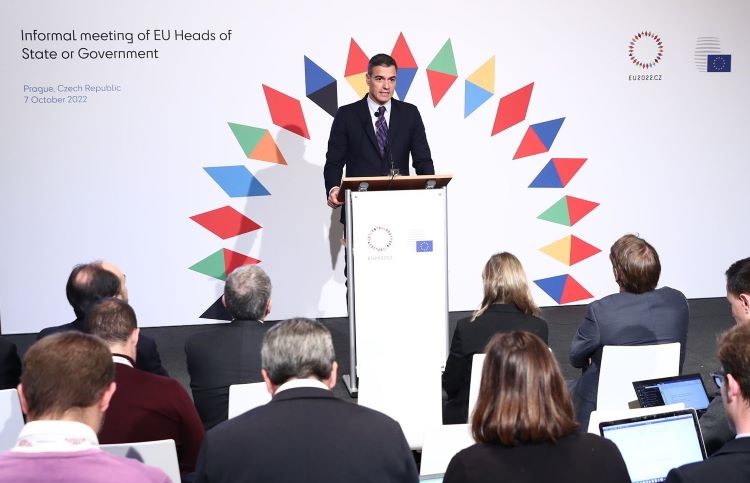Eduardo González
The President of the Government, Pedro Sánchez, confirmed yesterday in Prague that, before the next European Council at the end of October, he will hold a three-way meeting in Paris with the President of France, Emmanuel Macron, and the Portuguese Prime Minister, António Costa, to address the issue of energy interconnections, including the MidCat trans-Pyrenean gas pipeline, which France opposes in principle.
The meeting was agreed yesterday by the three leaders in the margins of the Informal European Council in Prague, which addressed Russia’s war in Ukraine, the energy crisis and the economic situation in the EU. According to Sánchez, the initial purpose of the three governments was to announce this Paris meeting by means of “a joint communiqué”, but the President of the Government himself was finally forced to confirm the meeting, during the press conference after the Council, after noting that Macron himself had already leaked it to the press.
“We wanted to be discreet,” admitted the Prime Minister. In any case, he confirmed, “there is going to be a meeting in Paris before the European Council to talk about interconnections, not only of gas but also of hydrogen, which are perfectly compatible, and about electrical interconnections, which some of us have between Spain and our neighbor France.” The Paris meeting, he continued, “demonstrates the will of the French government to find a solution that responds to its domestic demands”.
This information comes a day after Macron once again made clear his rejection of MidCat, the gas pipeline that would link the Iberian Peninsula with the rest of the EU through the Pyrenees, considering that electricity interconnections should be prioritized first.
During yesterday’s informal European Council, Sánchez raised the need to promote interconnections and, therefore, the MidCat gas pipeline (which Germany has expressly supported on numerous occasions) both before the rest of the EU leaders and individually with Macron himself. “One way or another, sooner rather than later, we are going to reach an agreement that marries all of France’s sensitivities and concerns,” he assured. “I am not going to say that I am optimistic,” but “I am convinced that a good agreement can be reached with a friend and ally like the French government,” he added.
On the other hand, and also in relation to the energy issue, Pedro Sánchez reiterated his support for the recent letter from the President of the European Commission, Ursula von der Layen, with measures to tackle the energy crisis. “Spain recognizes itself in those proposals,” he assured. “The Commission takes up many proposals and approaches of the Spanish Government since before the war”, such as the fixing of a ceiling on the price of gas imported by Europe, the joint and centralized purchase of gas from third countries, the structural reform of the electricity market and the extension to the rest of the EU of the so-called “Iberian mechanism” of energy management (which came into force last June 15 and limits the price of gas for electricity generation for a period of twelve months, thus covering the coming winter, when energy prices are more expensive). “We should be proud, because more and more countries in Europe intend to import this Iberian exception to turn it into a common European standard”, highlighted Pedro Sánchez.
During his speech at the Council, Sánchez announced that Spain will allocate part of the RepowerEU resources to complete the gas interconnection to the border with France. This interconnection, which could be ready in about eight months, would also be compatible with hydrogen. Likewise, and with regard to the reform of the EU electricity market, Sánchez asked that this be adapted in favor of a greater penetration of renewable energies and self-consumption.
Ukraine war, food security, fiscal rules
Regarding the war in Ukraine, European leaders this week approved the eighth package of sanctions against the Russian regime and denounced the illegal annexation of the Ukrainian territories of Kherson, Zaporiyia, Donetsk and Lugansk. “Spain will never recognize this unilateral modification of borders, which is contrary to international law, and will continue to help the people of Ukraine in their defense of democracy, freedom, international legality and human rights,” said the President before the rest of the European leaders.
Pedro Sánchez also showed his concern for one of the consequences of the war, such as the lack of food security. “In Europe we must make sure that Putin’s war does not generate a global food crisis,” warned the president, who insisted on the need to extend the grain export agreement that has allowed the transport from Ukraine, through the Black Sea, of nearly 3.7 million tons of cereals.
The 27 also addressed the upcoming reform of European fiscal rules and, in this regard, President Sánchez defended the need to review them to meet the dual objective of preserving sound public finances and strengthening sustainable growth by increasing public and private investment in areas aimed at the green and digital transition.







